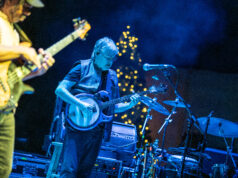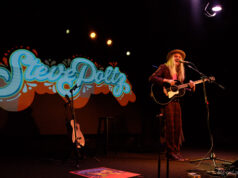
Druid Hill Park in the wind after a storm during Charm City Bluegrass Festival. (Photo by Matt Ruppert)
Waking on Friday, the forecast indicated thunderstorms and heavy winds in the neighborhood of 3 to 7 o’clock. The hours passed slowly, work keeping me busy; periodic texts from my wife, little checks of the app, and nervous glances outside the windows of classrooms marked the passage of the clouds, the speed of the winds.
I obsessed, orbiting around my own head, sipping green tea from my Harry Potter mug between moments of busyness. The phone buzzed with a tornado warning, though the storm window shortened, the likelihood of ruination a little less. A sheet of water fell over the city, thunder and trucks rumbled loudly, and the gates to Druid Hill Park stayed closed. Doors planned to open at 3pm on April 26, but nature had a different plan; we watched Twitter closely, and eventually, Charm City began in the latest afternoon possible, cold and rainy winds slowly ushering in the audience. We arrived just after Fireside Collective took to the stage, raincoats and parkas coloring the audience brightly; the band, growing from the embers of jam band Beside the Fire and stoked by a love for folk music, these boys from Asheville, North Carolina, kept the crowd warm and dancing.
We slid over to the next stage for Asheville compatriots Town Mountain, who is still touring recent (and sixth) record, New Freedom Blues, spreading their raucous brand of bluegrass. New Freedom Blues is the first of their albums to quite match the energy and sound of their live show: nestled somewhere between the mountains and the fields, and a little bit of moonshine.
While the music acts as the center, Charm City’s backdrop defines it. Fans weathering the storms, children tumbling down the hills, bubbles soaring across the sky. The smell of food, the many vendors offering various goods, including clothing, mandolins, kayaks. The crew of the festival are everywhere, helpful to anyone who appears in need. Rob Ickes and Trey Hensley followed Town Mountain, bringing their unique blend of true country songs and stunning bluegrass instrumentation. Rob is one of – if not the – the best dobro players on the face of the planet, as well as being the most awarded musician in the International Bluegrass Music Association’s history (17 times best dobro player, I think). He’s played with pretty much everyone at some point or another. Trey Hensley has played guitar in the bluegrass world since the age of 10, even hitting the Grand Ole Opry by 11. He’s also played with pretty much everyone at this point. They have two albums together, the most recent being The Country Blues. They played from both albums, some covers and originals, and altogether stunned the audience with their virtuosity.
A little more rain fell, and the wind began to buffet the trees and people of Charm City as Jeff Austin and friends came onto the stage. Mostly dark, they came out on stage, Jeff Austin and a group of collaborators that included stalwart banjoist Kyle Tuttle, a near-constant foil for the mandolinist since he left Yonder. Jeff Austin had a special plan for the night: to play through the genre-creating/busting John Hartford album Aereo-Plain, a record created with the loose spirit of the ’70s mixed with the virtuosic bluegrass talents of the band around him.
Eventually credited with beginning the newgrass sound, it’s influenced nearly everyone who’s picked up a bluegrass instrument since the ’70s, either directly or indirectly (for the uninitiated, its influence bears a similarity to Big Star’s influence on power pop rock and roll or Velvet Underground’s influence on noise and indie rock). Jeff Austin and friends more than embodied the album, even playing to its easy style and quirky humor. When Jeff sang what I call the farting song (“Boogie”), that wild sense of joy that pervades Aereo-Plain washed over Druid Hill Park; at the same time, the men onstage played with the same kind of wildness, the same kind of joy. It is no small understatement to say that this is a set that will be hard to match.
The next morning brought bright sunlight, the clouds well-chased by the still-roaring wind. The audience already swelled beyond the previous night’s peak within the first hour; as we walked into the park, Wicked Sycamore — the winners of the Charm City Battle of the Bands — sang sweet harmonies and showcased deft instrumentation (despite the cold-fingered breezes) on “Santa Cruz”, with a standout moment being a cover of Sarah Jarosz’s “House of Mercy.” They would later play an equally beautiful – and warmer – set of songs under the tent of the small stage, which felt a little less like a festival and a little more like a church revival.
Maybe April followed, their three-part harmonies clarion calls through the whistling wind, drawing the ever-expanding crowd closer; the highlight of their set was the cover of the Bonnie Raitt song “I Can’t Make You Love Me” (all credits to my friend Shantel and wife Jess for helping me figure out the song).
Charm City Bluegrass Festival has two main stages, side by side. This creates an interesting effect on the crowd, which shuffles side to side, becoming denser throughout the day, but nevertheless constantly swaying. It danced over to and with Jon Stickley Trio, comprised of Jon Stickley on guitar, Lyndsey Pruitt on violin, and Hunter Deacon on drums. They don’t sing, and that’s okay; they play a progressive blend of bluegrass and something like jazz, a small kind of revelation. Jon magics music from his guitar while Lyndsey adds flowy flourishes throughout, all while Hunter adds smart touches from the back of the stage.
The appropriately named Charm City Junction followed, but only after festival organizers Phil and Adam issued an award to Brad Kolodner, the band’s clawhammer banjo maestro, for all the work he’s done for the Baltimore community. Their muscular, grooving sound set the pace for the next hour, with Patrick McAvinue (IBMA fiddler of the year in 2017), Alex Lacquement, and Sean McComiskey (the odd but wonderful accordion) all more than playing their parts, showing both a collective and individual virtuosity. To say that they know how to play is an understatement.
The wind blew us next over to Hawktail, a band borne of other bands but wholly their own. Brittany Haas, Paul Kowert, Jordan Tice released a self-titled album back in 2014 (appropriately titled Haas Kowert Tice), adding Colorado mandolinist Dominick (and completely rewriting and rerecording the album they’d already made). Dominick’s addition had such an impact that they rebranded themselves as Hawktail in order to create and release Unless, an unexpected album filled with invention, beauty, and mystery. Throughout, they maintain an emphasis on their gifted instrumentation, atmospheric and synergistic to the point that listening to it feels like a private gift every time.
The kaleidoscope of sounds they create results in a sort of labyrinth, but they leave a thread to carry out the audience; their sound includes much of what we writers and fans call bluegrass, but the truer answer is folk music with some of the same influences. What they play rests less at an intersection and more at a complicated traffic circle with a dozen roads leading to it: bluegrass, Celtic, American and European folk, jazz, country, a little jazz, and plenty of touches of other sounds my under-educated ear cannot quite capture.
This set, in the middle of the day, felt timely and timeless, their playing joyful and honest. It set up an easy fantasy imagining them crowded in a kudzu-crowded backyard, grill smoking away, whiling away the setting sun with the smoke. In truth, I could have danced or lain in the grass all day listening to Hawktail and ended content. Brittany’s fiddle tapped toes into the rain-softened earth, while Paul’s fingers danced the songs along. Their stage relationship — maybe by proximity? — definitely stunned. But Jordan and Dominick more than added flair and style, playing deftly and intelligently.
Maybe my favorite aspect of their sound, their show, lies in their gift for restraint; they resist the urge to tear forward at a breakneck pace, lending their songs an air of intricacy, intimacy. They played mostly instrumentals – that’s their trade, after all – though granting the audience a cover of a Doc Watson tune, eliciting a quip from Jordan that this would be a good time to check the merch table (they more than did the Doc proud). They spent most of their time smiling, a private language easily shared through little laughs and eye contact, knowingly and quietly betraying that they consider each other close friends. Do yourself a favor and buy Unless as soon as you can, and then work your way through the expansive catalogs these artists have all cultivated over the last decade-plus.
Seldom Scene followed, proving they continue to be the quintessential bluegrass act of Maryland, and guitarist Dudley Connell proudly announced this with his hat honoring the state. All of them continued to prove their incredible gift for three-part harmonies, as well as continuing to show the way they marry bluegrass with elements of other genres. Dudley continued to share his trademark smile and joy on the stage, though telling fewer stories than when they played at the 8×10 in January. Lou Reid (mandolinist) again shared his achingly beautiful rendition of “Sweet Baby James”, along with a host of other stellar Seldom Scene songs, including a new one. They have an album called Changes coming out June 7 that you can preorder.
As shadows lengthened and the sun shone orange across the stage, Melody Walker strode to the mic, shimmering in a rainbow cloak, the changing colors complementing her pink and plum hair, a shirt with FEMINIST emblazoned across the chest, announcing the arrival of Front Country. Their second time coming to Charm City in as many years, they wasted no time jumping into the set, Melody’s powerhouse voice exploding across the park. It’s hard to articulate the band’s power; mandolinist Adam Roszkiewicz shone just as much as Melody, but the band around them played tight, their brand of California bluegrass (greengrass?) meshed with something almost like rock and punk. After their set, the band came out and Melody spent time talking to young and old fans alike. It’s hard to imagine they won’t come back to Charm City again.
Frank Solivan is a true master of the mandolin (and, if you follow on social media, a helluva leatherworker and apparently a highly skilled chef), having also collected a group of musicians around him just as good at their respective instruments (Chris Luquette on guitar, Mike Munford on banjo, Jeremy Middleton on bass). They recently put out the record If You Can’t Stand the Heat in January, further cementing their place in the annals of bluegrass and deserving credit for creating a different direction for the sound to go in the future. Some of their songs fit neatly into the “anthem” category, easy for singing along, but the instrumentation and playing are never sacrificed.
Frank Solivan possesses a plaintive voice well-buoyed by the strains and rhythms of bluegrass, fitting into place somewhere between mountain folk and blues, resulting in a river-deep sound. In person, the qualities of his voice and their playing manage to shine even more, the mix loud but crystal clear. The band know each other implicitly, play off each other playfully and carefully; they nod appreciatively at each other’s solos, laugh and smile at each other’s jokes. They’re just a flat-out great band and fit the camaraderie and joy of Charm City like a glove. Indeed, they even jumped onstage to play with both The Seldom Scene and Steep Canyon Rangers.
A personal note about the next band: Steep Canyon Rangers was one of my first favorites in the bluegrass scene, and I’d still never seen them before this festival. I have eagerly anticipated their set for months now, to have the opportunity to see their unique blend of bluegrass and americana ripple through the Druid Hill trees. Many folks have long considered them Steve Martin’s backing band — and they are — but they are a long-running band unto themselves, a sextet of players with a traditional bluegrass quintet and a percussionist on top. They play bluegrass instruments, so it’s often characterized as bluegrass, though it’s certainly more than that. They have the foot-stomping jams and the long plaintive cries of bluegrass, but they also have that almost West Coast bluegrass sound, a blend of what I call Colorado folk, bluegrass, and music made as much for the prairies as the mountains. They leave plenty of space, like any great musicians, though they always work to Woody Platt’s voice. A special moment came when they crowded around a single mic for a few songs, unplugged, the music viscerally close and honest. The playful “Shenandoah Valley” and the lonesome qualities of “Let Me Die in My Footsteps” shone brightly.
Deer Tick is a band that needs no introduction to most fans of alt-country and indie rock, with John McAuley long being the standard bearer for a certain kind of sound. Ian O’Neil (guitar, vocals), Dennis Ryan (drums, vocals), and Chris Ryan (bass, backinga vocals) comprise the rest of the band, all of whom have been playing together since 2009 (O’Neil joined later). On their most recent releases, including Deer Tick Vol. 1 and Deer Tick Vol. 2, as well as recent collection Mayonnaise – they’ve skirted the line between acoustic and electric carefully and joyfully. They began as more of a folky project and have navigated the following decade-plus by expanding on their sound, always enhancing their dynamic tendencies, their hard-won perspectives colored by alternately dark and sometime humorous lyrics. I remember hearing War Elephant way back at the end of college, getting sucked into the songs “Art Isn’t Real” and “These Old Shoes”, following them through the years while thoroughly ignoring Pitchfork’s tepid tendencies.
Deer Tick waited offstage – the only band of the day to do so – walking out after the announcement, all dressed in various shades of pink. The sun had fallen behind the trees just prior to the first song, the stage lights emphasizing their outfits. John McAuley raised his Miller Lite can to the audience, and they plunged into the set, taking turns as lead vocalists (John, Ian, and Dennis all write songs). At one point, Ian pulled out a mandolin and John exclaimed something like, “See, a bluegrass instrument!”, nodding amusingly to the fact that they are very much not a bluegrass band. Deer Tick has built a reputation as an active, almost-wild band onstage, and they didn’t disappoint; John did back bends, Ian jumped around and damn near thrashed his guitar, while Chris maintained the constant stoicism of a bassist. They played all of the expected songs and a few that surprised me. My wife grinned ear to ear for “Sea of Clouds” and I matched her for “Baltimore Blues No. 1”. They played a little bit past their stated set time, but nobody complained. Might not have been bluegrass, but good rock and roll is always good fun.
Next came the headliners, some of Baltimore’s own. I came to The Bridge late, either overly involved in high school (goody-two-shoes), college out of town, or learning how to be an adult, I missed them during their heyday. Cris Jacobs and Cris Jacobs Band, however, I know well. I used his music as a starting point, traveling backwards in time to discover The Bridge’s albums (and music on Live Archive), developing a special interest in a couple of their 8×10 shows. The Bridge also don’t match the bluegrass theme of the festival, instead fitting neatly into the jamband universe, though they sure do match the Charm City theme.
While Deer Tick played, the boys of The Bridge prepped for their set, talked, and laughed. Cris Jacobs’ young daughter ran across the stage to him, busting the moment into one of even wider joy, as he picked her up with a wide smile. By the time Deer Tick ended, the sun had finished setting, the concert lighting coloring the band mostly blue. They don’t play often these days – the time 200 shows a year nearly a decade past, – but every time they do, they make it count, playing long and filling the night with jam after jam. From guitar to mandolin to saxophone, every member of the band had ample opportunities to shine. They even invited Patrick McAvinue of Charm City Junction onstage to add his virtuosity to the proceedings. It’s hard to think of a more Baltimore band than The Bridge and anyone more to close the festival.
Already looking forward to next April.
Here are a few more pictures from the Charm City Bluegrass Festival at Druid Hill Park, Baltimore, on April 26 and 27, 2019. All photos courtesy and copyright of Matt Ruppert.






























































































